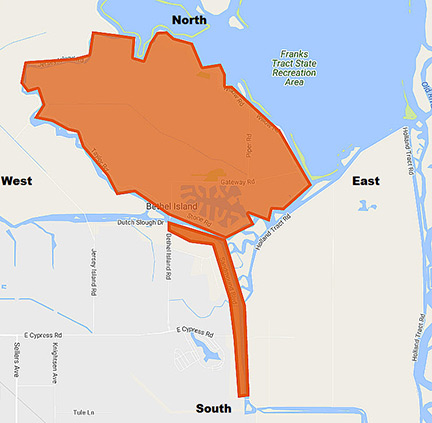Due to the high numbers of mosquitoes in the area, the Contra Costa Mosquito & Vector Control District will be fogging by truck-mounted, ultra-low volume sprayers to control adult mosquitoes.
- DATE: Thursday, May 11, 2017
- TIME: Between 4:30 a.m. and 8:30 a.m., weather permitting.
The area to be treated is bordered on the north by Willow Road and Levee Road; on the west by Taylor Road, Levee Road and Sandmound Boulevard; on the east by Stone Road and Willow Road; and on the south by Wells Lane and Sandmound Boulevard.
MATERIALS USED: The insecticide to be used is Zenivex E4, RTU applied at a rate of 1.5 ounces per acre by truck-mounted, ultra-low volume sprayers.
MAP: (For an interactive map, please click here – available shortly after this notification is published)
The Contra Costa Mosquito & Vector Control District utilizes an integrated vector management program which means we use a variety of protocols for controlling mosquitoes. These protocols include public education, physical control such as managing vector habitat, biological control such as mosquitofish, and chemical control such as pesticides.
The majority of the District’s mosquito control is completed when mosquitoes are still in their aquatic form, in their water source. Once mosquitoes emerge from the water as adults, the only effective method to control them is by using pesticides. We use only those products registered with the Environmental Protection Agency for the use of mosquito control and protecting public health. They are applied by our trained and certified technicians.
Adult Mosquito Spraying FAQ
Q. What will trigger spraying?
A. If West Nile virus is detected in the community or there are high numbers of mosquitoes in an area, the District’s initial response will be to intensify its efforts to reduce mosquito breeding sites and increase its levels of larviciding in those areas in which West Nile virus has been found. Reducing the adult mosquito population with pesticides (adulticides) registered by the US Environmental Protection Agency (EPA) will be done if necessary to prevent human illness or to suppress a heavy infestation of mosquitoes. The decision to spray, either by truck mounted sprayers or by aircraft, will be based on surveillance information or the documentation of West Nile virus activity at a level that indicates a threat to human health. Spraying will be concentrated in areas most at risk for disease occurrence and will be conducted by certified and licensed applicators. The District’s aggressive campaign against mosquito larvae is intended to minimize the need to use adulticides.
Q. What pesticides will you use?
A. When necessary, our District may use ground and aerial application of pesticides to kill mosquitoes that pose a health risk to the residents of Contra Costa County. In the case of adulticiding, or targeting adult mosquitoes, we would use botanical insecticides (plant derived compounds) or synthetic versions of, that include pyrethrins and synthetic pyrethroids, as well as piperonyl butoxide. In an emergency situation, we may use malathion or sumithrin. All of the products we use are registered with the Environmental Protection Agency and applied according to label directions by our trained and certified technicians. Click here for more information on pesticides used in adult mosquito control.
Q. What risks are there to the residents of Contra Costa County?
A. The risks to the public and to the environment are very low. Mosquito adulticides are applied as ultra-low volume (ULV) sprays. ULV applications involve small quantities of active ingredient in relation to the size of the area treated, typically less than 2 ounces per acre, which minimizes exposure and risk to people and the environment.
Q. Where will the spraying take place?
A. The spraying will take place in areas of concern, as determined by our mosquito and disease surveillance programs. Our trained and certified technicians use a variety of surveillance techniques and treatment criteria to ensure effective mosquito control with the least amount of risk to our residents and our environment.
Q. What are the risks to the environment?
A. The risks to the public and to the environment are very low. Mosquito adulticides are applied as ultra-low volume (ULV) sprays. ULV applications involve small quantities of active ingredient in relation to the size of the area treated, typically less than 2 ounces per acre, which minimizes exposure and risk to people and the environment.
Q. Are the insecticides exclusive to West Nile?
A. No. The pesticides we use target a variety of mosquitoes than can transmit West Nile virus as well as other diseases.
Q. Should I Take Steps to Reduce Exposure to Pesticides During Mosquito Control Spraying?
A. Generally, there is no need to relocate during mosquito control spraying. The pesticides have been evaluated for this use and found to pose minimal risks to human health and the environment when used according to label directions. All of the products we use are registered with the Environmental Protection Agency for controlling mosquitoes and protecting the public.
Although mosquito control pesticides pose very low risks, some people may prefer to avoid or even further minimize exposure. People who suffer from chemical sensitivities or feel spraying may aggravate a preexisting health condition may:
- Consult their physician or local health department and take special measures to avoid exposure.
- Close windows and turn off window-unit air conditioners when spraying is taking place in the immediate area.
Information provided by Contra Costa Mosquito & Vector Control District

